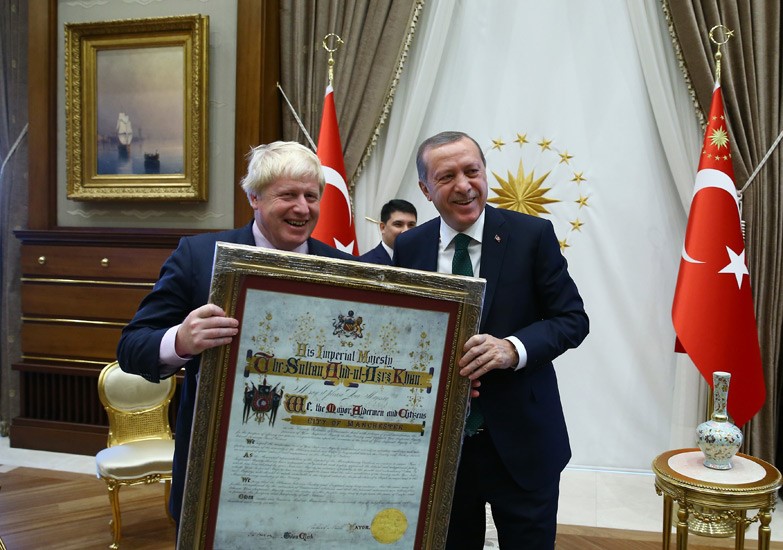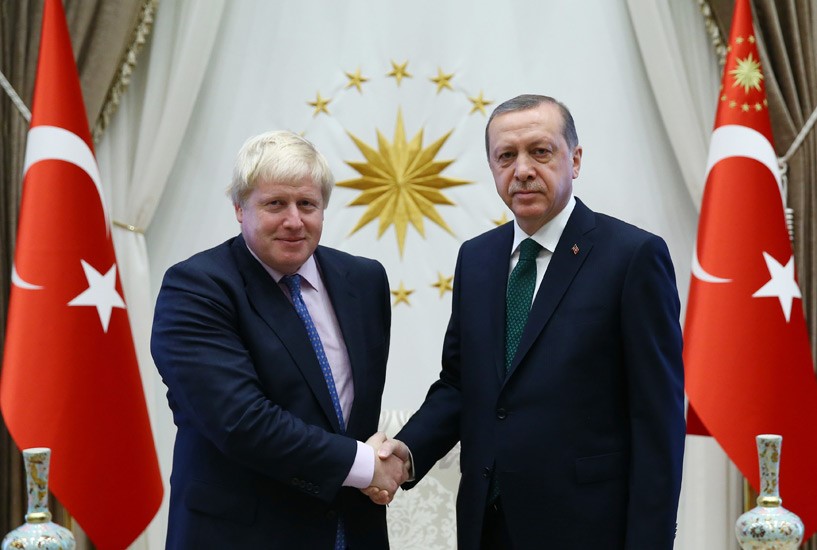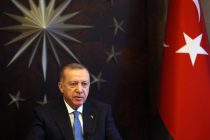Boris Johnson carefully side-stepped a question about the crude poem he wrote about Turkish President Recep Tayyip Erdoğan during an official visit to Turkey. The British foreign minister had travelled to Turkey to try and strengthen ties between Ankara and London following Britain’s decision to exit the EU.
Johnson, whose paternal great-grandfather Ali Kemal was Turkish, described Turkey as “the land of my fathers”, while also singing the praises of Turkish industry. On Monday, he told the press he owned a “beautiful, very well functioning Turkish washing machine”.
A question about his poem arose during a press conference with his Turkish counterpart, Mevlüt Çavuşoğlu on Tuesday. Johnson said he was “delighted” the poem had not come up at all during his meetings.
He said what people in Turkey most wanted to hear after the failed July 15 coup was “about our commitment to Turkey… and that is very strong.”
Referring to the poem, he said: “As for the trivia that you raised… it has not come up at all.”
Afterwards Johnson met with President Erdogan at the president’s palace. While the initial photos of the two politicians shaking hands looked awkward, any ill-feelings over Johnson’s poem were clearly put aside and by the time the Turkish President had gifted the British FM with a replica of an Ottoman sultan’s letter to a Manchester mayor, both men were laughing.

Johnson’s crude poem about the Turkish President
In May, the outspoken former Mayor of London penned the winning entry in The Spectator’s offensive poetry competition about Erdoğan. The British publication had run the competition in response to the growing number of law suits – over 2,000 at the time – launched by Turkish President against people who had said ‘offensive’ things about him.
Johnson’s verse was inspired by the case of comedian Jan Böhmermann, who was also being sued by President Erdoğan after he recited a controversial poem on television, later deemed “abusive and libellous” by a German judge, questioning the sexual habits of the Turkish president. Johnson wrote the limerick before he was appointed foreign minister in July:
There was a young fellow from Ankara
Who was a terrific w***erer
Till he sowed his wild oats
With the help of a goat
But he didn’t even stop to thankera.
Cake diplomacy
The poem was not the only source of irritation for the Turkish government. During the EU referendum campaign, Johnson and fellow Brexit supporters were highly vocal in presenting Turkey’s EU accession as a threat to Europe. Their xenophobic comments were widely condemned at the time by the British Turkish community.
To counter, Johnson turned on the charm with his Turkish hosts, emphasising the UK’s desire to increase economic ties with Turkey, calling for a “jumbo free trade deal” between the two countries.
The British FM tactfully recognised Turkey’s growing economic muscle, remarking how Jaffa Cakes, an iconic biscuit brand “that I grew up on as a child” were now owned by Turkish confectionary giant Ülker.
“What more visible symbol could there be of our economic partnership than that,” he added.
In response to Turkey’s continuing efforts to join the EU, Johnson also said: “We will in the UK remain passionate and committed supporters of Turkey and of the Turkish cause… but we will also be seeking to intensify our own partnership with Turkey.”

Johnson also tried to mend cultural bridges by acknowledging his Turkish ancestry. He proudly talked about his great-grandfather Ali Kemal, who was briefly an Ottoman minister after World War I, as well as other Turkish relatives, including one who served as a senior diplomat:
“Some of you may know this is the land of my fathers, this very (foreign) ministry is the place where my relatives used to work, [including] my great uncle Zeki Kuneralp.”
The British FM condemned the July 15 coup bid as a “violent… deeply anti-democratic (and) deeply sinister” attack on Turkish democracy. He also pledged to take action against any UK organisations affiliated to Fethullah Gülen, the Islamic preacher based in the USA whom Ankara blames for the coup attempt.
Johnson said the Gülen movement “seems to me to have many aspects of a cult” and that the British government would, “have to look now very seriously at the implications for so-called Gulenist organisations in our country.”




